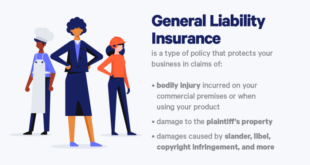Business general insurance serves as a cornerstone of financial protection for enterprises, safeguarding them against a myriad of risks and uncertainties that can jeopardize their operations and stability. This comprehensive guide delves into the intricacies of business general insurance, empowering business owners with the knowledge to make informed decisions and secure their ventures.
Within this guide, we will explore the diverse types of business insurance available, highlighting their benefits and applicability. We will delve into the significance of business insurance, shedding light on the potential liabilities and risks that businesses face. Additionally, we will provide expert guidance on selecting the right insurance provider, ensuring that businesses find the optimal coverage for their unique needs.
Business Insurance Types

Business insurance offers a safety net for companies, safeguarding them against potential financial losses and liabilities. Various types of business insurance exist, each tailored to address specific risks and provide comprehensive protection.
The following table presents a detailed overview of different business insurance types, their benefits, and examples:
| Type | Benefits | Examples |
|---|---|---|
| Property Insurance | Covers damage or loss to physical assets, such as buildings, equipment, and inventory, caused by events like fire, theft, or natural disasters. | – Building and Contents Insurance
|
| Liability Insurance | Protects businesses against claims for injuries or damages caused to third parties due to negligence or faulty products. | – General Liability Insurance
|
| Business Income Insurance | Provides financial support to businesses in the event of income loss due to covered events, such as natural disasters or equipment breakdowns. | – Business Interruption Insurance
|
| Cyber Insurance | Covers businesses against financial losses and liabilities arising from cyber threats, such as data breaches, hacking, and ransomware attacks. | – Cyber Liability Insurance
|
| Workers’ Compensation Insurance | Provides benefits to employees who suffer work-related injuries or illnesses, including medical expenses, lost wages, and disability compensation. | – Statutory Workers’ Compensation Insurance
|
| Errors and Omissions (E&O) Insurance | Protects professionals, such as accountants, lawyers, and consultants, against claims for negligence or errors in providing services. | – Professional Liability Insurance
|
| Directors and Officers (D&O) Insurance | Provides coverage for directors and officers of companies against claims related to their decisions and actions in managing the business. | – Directors and Officers Liability Insurance
|
| Commercial Auto Insurance | Covers businesses for liability and property damage caused by company-owned or leased vehicles. | – Commercial Auto Liability Insurance
|
| Umbrella Insurance | Provides additional liability coverage beyond the limits of other business insurance policies. | – Commercial Umbrella Insurance
|
Importance of Business Insurance
Business insurance is crucial for protecting your company against potential risks and liabilities. It provides a safety net, ensuring financial stability and peace of mind in the face of unforeseen events.
Businesses face a wide range of risks, including property damage, liability claims, employee injuries, and business interruptions. Without adequate insurance, a single incident could have devastating consequences, potentially leading to financial ruin or even business closure.
Real-Life Examples, Business general insurance
- A restaurant that suffered a fire and was able to rebuild quickly thanks to business insurance coverage.
- A construction company that faced a lawsuit from a worker who was injured on the job, but was protected by liability insurance.
- A retail store that lost revenue due to a natural disaster, but was able to recover thanks to business interruption insurance.
Choosing the Right Insurance Provider: Business General Insurance

Selecting the right insurance provider is crucial for businesses to ensure they receive comprehensive coverage at competitive rates. Here’s a comprehensive guide to help businesses make an informed decision:
Factors to Consider When Comparing Providers
- Financial Stability:Assess the provider’s financial strength and ratings from independent agencies like AM Best or Standard & Poor’s.
- Coverage Options:Evaluate the range of coverage options available to meet specific business needs, such as general liability, property, and business interruption insurance.
- Claims Handling:Research the provider’s reputation for prompt and fair claims settlement, as well as the ease of the claims process.
- Customer Service:Consider the availability of dedicated customer support, response times, and the level of personalized service offered.
- Industry Expertise:Identify providers who specialize in insuring businesses within the specific industry, as they have a deeper understanding of unique risks and coverage requirements.
- Pricing and Premiums:Compare insurance premiums from multiple providers, but avoid sacrificing coverage for lower costs. Consider factors like deductibles and coverage limits.
Tips for Negotiating with Insurance Companies
- Prepare and Organize:Gather all relevant business information, including financial statements, loss history, and safety measures.
- Understand Your Needs:Clearly define your coverage requirements and identify areas where you need protection.
- Shop Around:Obtain quotes from multiple insurance providers to compare coverage and premiums.
- Negotiate:Discuss premiums, deductibles, and coverage limits with the insurance provider, and be prepared to compromise on certain aspects.
- Build a Relationship:Establish a strong relationship with your insurance provider by being transparent and responsive to their requests.
Filing a Business Insurance Claim
Filing a business insurance claim can be a stressful experience, but it’s important to know the process so you can get the coverage you need quickly and efficiently. Here’s a step-by-step guide on what to do after a covered event:
Notify Your Insurance Company
The first step is to notify your insurance company as soon as possible after the covered event. You can do this by calling the number on your insurance card or by logging into your online account.
Gather Evidence
Once you’ve notified your insurance company, you’ll need to gather evidence to support your claim. This may include:* Photos or videos of the damage
- Receipts for repairs or replacements
- Medical records if someone was injured
- Police reports if the event was a crime
Submit Your Claim
Once you have gathered your evidence, you can submit your claim to your insurance company. You can do this online, by mail, or by fax.
Follow Up
Once you’ve submitted your claim, your insurance company will review it and make a decision. If they approve your claim, they will send you a check for the amount of the coverage. If they deny your claim, you can appeal the decision.
Common Mistakes to Avoid
When filing a business insurance claim, there are a few common mistakes to avoid:* Delaying your claim.The sooner you file your claim, the sooner you’ll get the coverage you need.
- Not gathering enough evidence.The more evidence you have to support your claim, the more likely you are to get approved.
- Exaggerating your claim.If you exaggerate your claim, your insurance company may deny it.
- Not following up.Once you’ve submitted your claim, be sure to follow up with your insurance company to make sure they’re processing it.
Business Insurance Coverage

Business insurance policies provide a comprehensive range of coverage options tailored to protect businesses from various risks and financial losses. These coverages encompass a wide spectrum of perils, ensuring that businesses can safeguard their assets, operations, and financial well-being.
The limits of coverage and exclusions vary depending on the specific policy and the insurance provider. It is crucial for businesses to carefully review and understand the terms and conditions of their insurance policies to ensure adequate protection and avoid any gaps in coverage.
Property Coverage
- Commercial Property Insurance:Protects against physical damage or loss to business premises, equipment, inventory, and other property owned by the business.
- Business Interruption Insurance:Covers lost income and expenses incurred due to a covered event that disrupts business operations.
Liability Coverage
- General Liability Insurance:Provides protection against claims of bodily injury or property damage caused by the business or its employees to third parties.
- Product Liability Insurance:Protects against claims arising from injuries or damages caused by defective products sold or manufactured by the business.
- Professional Liability Insurance:Covers claims against professionals (e.g., lawyers, accountants) for errors or omissions in their professional services.
Other Coverages
- Cyber Liability Insurance:Protects against financial losses and legal expenses resulting from data breaches, cyber attacks, or privacy violations.
- Workers’ Compensation Insurance:Provides coverage for medical expenses, lost wages, and other benefits to employees who suffer work-related injuries or illnesses.
- Directors and Officers (D&O) Insurance:Protects directors and officers of a business from personal liability for claims arising from their decisions or actions on behalf of the company.
Examples of Coverage Application
- Commercial Property Insurance:A fire damages the business premises, destroying inventory and equipment. The insurance coverage compensates for the cost of repairs and replacement of lost property.
- General Liability Insurance:A customer slips and falls on the business premises, resulting in injuries. The insurance coverage covers the medical expenses and legal liability of the business.
- Product Liability Insurance:A defective product sold by the business causes injuries to a consumer. The insurance coverage protects the business from financial losses and legal claims.
Wrap-Up
In conclusion, business general insurance stands as an indispensable tool for businesses of all sizes. By understanding the various types of coverage available, the importance of insurance, and the strategies for choosing the right provider, business owners can safeguard their enterprises against unforeseen events and secure their financial well-being.
This guide has provided a comprehensive overview of business general insurance, equipping readers with the knowledge and insights to make informed decisions and protect their ventures for long-term success.
User Queries
What are the key benefits of business general insurance?
Business general insurance offers a range of benefits, including protection against financial losses due to property damage, liability claims, business interruption, and more. It provides peace of mind, allowing businesses to focus on their operations without the constant worry of unforeseen events.
How much does business general insurance cost?
The cost of business general insurance varies depending on several factors, such as the type of coverage, the size of the business, and the industry in which it operates. It is important to compare quotes from multiple insurance providers to find the most competitive rates.
What are the common exclusions in business general insurance policies?
Common exclusions in business general insurance policies include intentional acts, criminal activities, and losses due to war or terrorism. It is important to carefully review the policy wording to understand the specific exclusions that apply.
 Nenroll Nenroll News
Nenroll Nenroll News





